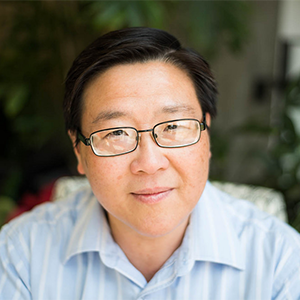
In Ng’s view, she was a part of University governance from day one. Every faculty at UMM is a part of the campus assembly, the campuswide governance body. And, Ng adds, “UM-Morris is a very egalitarian campus, and so technically, I became involved in shared governance when I started as a regular faculty.”
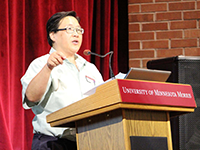
Ng admits that when she was a brand new faculty, she was very naive. “I had some weird notion that college administrators made lousy professors,” she says. A few years years later, a chief administrator retired and there was some shuffling of campus leadership. Several faculty, including Ng, were asked to take on administrative duties as part of their appointments. Ng asked her then boss, “Why do you take all these award winning and excellent teachers from the classroom and make them administrators?”
The response was, “Would you rather I choose lousy teachers to lead academic affairs?” That, Ng says, changed her perspective and stereotype of administrators. In turn, Ng says she has learned much by being on systemwide committees and considers herself lucky to be able to serve. “I am a better faculty and a more mindful academic administrator for having served on systemwide shared governance,” she says. Ng says when a solution presents itself or is arrived at, she asks if that solution solves more problems than it creates.
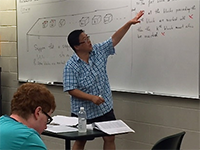
An essential skill, Ng notes, and one that she continues to hone, is learning how to balance the “Big Picture” and the detailed ramifications of policies. She said, “Finding a healthy balance between being consultative and moving forward is also another key to how I usually approach governance.”
P&A News for October 2016. Highlights include Spotlight on Alyssa Maples, academic advisor, School of Kinesiology.
The Spring 2016 University Senate Semester Update is now available to download.
Here's a preview of what you'll find inside:
- Governance Working for U - Updates from the Faculty, Student, P&A, and Civil Service Consultative Committees
- Recognizing Outstanding Service to University Senate Governance
- A View from the Inside - Peter Haeg, Director, Professional Education, College of Pharmacy
- Meeting Updates
- Senate Committees Collaborate on Issues
- Restroom and Locker Room Access
- Retirement Plan Fiduciary Governance Structure
- Order of Status Quo Limits Some Committee Work
- Adjourned - A message from Collin Campbell, chair of the Senate/Faculty Consultative Committees
READ IT NOW
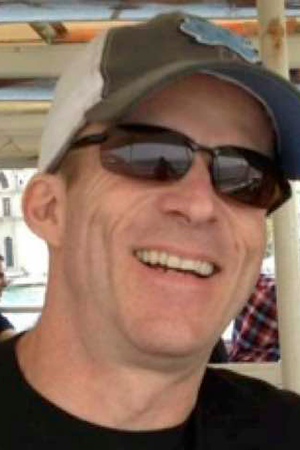
What is your role at the University of Minnesota? What do you do in a typical day/week?
I partner with faculty and staff at the U to conduct systematic assessments of the impact of educational innovations.
How does your work impact the University community?
I try to contribute to the growing body of knowledge about what works in post-secondary education and encourage faculty members to think of their teaching as a scholarly endeavor.
What do you enjoy most about your role?
Probably the best thing is having the chance to discover new things about teaching and learning. Sometimes the conclusions that my colleagues and I reach are relatively small, in the sense that they are bound to a particular time and place, a certain group of students, etc. But they are often things that no one knew before, and I think that sharing these findings with colleagues, and adding them to the larger tapestry of what is known about education, are valuable contributions to the academic enterprise.
What would people never guess you do in your job?
I do a surprising amount of consultation with faculty and staff from universities around the world, who want to undertake projects similar to those we've done at the University of Minnesota. With respect to two of our projects - the long-running student and faculty technology surveys, and our multi-year research on new learning spaces - I have consulted with faculty and staff from universities in China, Taiwan, Singapore, Australia, New Zealand, Canada, Sweden, The Netherlands, England, South Africa, Lebanon, Pakistan, and the Cape Verde Islands.
What do you like best about working at UMN?
One of the very best things is having the opportunity to collaborate with faculty and staff from such a diversity of disciplines across the University. Before working here, I was a professor of philosophy, and I never associated with anyone who works in engineering, or chemistry, or educational psychology, or agricultural economics, or veterinary medicine. And so I never knew how many interesting topics are studied by such a wide array of intelligent, interesting people in such a wide range of academic disciplines!
Where do you see yourself in 5 years?
My larger agenda is to promote a scholarly culture of pedagogy at the University, which means elevating teaching and learning to the status of an academic pursuit that can be undertaken by instructors whose disciplinary expertise lies elsewhere. So in 5 years, hopefully I will be working in much the same capacity that I am in now, but with a larger group of researchers who collaborate with faculty members from many disciplines at different organizational levels in the University - departmental, program, college, etc. - helping to advance the scholarship of teaching and learning.
What is one thing you couldn't live without?
Badminton, biking, beer, and hot sauce! And my two little dogs. OK, that was six things.
What do you like to do in your spare time?
Brew beer, play badminton, ride my bike, and spend time with my two little dogs.
What was your best vacation?
Probably a recent trip to Turkey with my partner and two close friends. It was my first trip to a majority-Muslim country, and it was wonderful to see how kind and welcoming the vast majority of Turkish people were, along with the way in which very religious and very secular Turks lived side by side in Istanbul. We also traveled to parts of the country without many tourists. I think it's a very useful, and very educational, experience for the members of a majority ethnic group - like white Americans - to visit a place in which they are very much in the minority.
The June 2016 issue of the P&A Senate Newsletter is now available for download.
In this issue:
- Message from the P&A Senate Chair - Susanne Vandergon
- Announcements
- P&A Outstanding Unit Award
- May 6 Meeting Notes
- Office of Public Engagement
- P&A Senate Subcommittee Reports
- Strategic Planning Update
- P&A Employee Spotlight - J.D. Walker
READ IT NOW
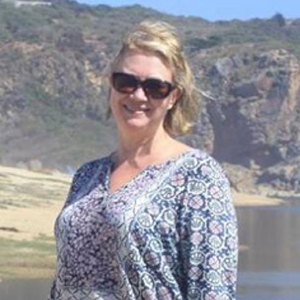
What is your role at the University of Minnesota? What do you do in a typical day/week?
The Office for Conflict Resolution serves faculty, staff and student employees who are experiencing conflict in the workplace. We offer both formal and informal conflict resolution services, and provide programming around effective ways to prepare for and respond to conflict when it occurs. Most of work involves informal, confidential consultations with employees - except in limited situations involving health and safety, we do not take any action unless requested to do so by the visitor to our office.
How does your work impact the University community?
Most people find conflict uncomfortable and difficult to manage. We encourage people to see conflict as an inevitable byproduct of being human, and to realize that, while challenging, conflict presents an opportunity for growth and learning. We hope that by helping members of the University community resolve conflict more quickly, effectively and constructively we can help support a workplace that is inclusive and allows all to do their best work. As an independent office that is not part of OHR or OGC, we find that visitors to our office can feel comfortable sharing their concerns in a safe and confidential environment.
What do you enjoy most about your role?
I get to connect with interesting people every day. For most of them, conflict resolution is not something that they have studied or practiced. I love the fact that with very little coaching, I can help people feel better supported and equipped to manage the conflict they face.
What do you like best about working at UMN?
I have only been at UMN since August 2014. I'm still learning about the University and the way it operates. In general, my favorite part is that no two days are the same. I have learned an incredible amount by working on diverse issues in all kinds of different settings. I am proud of all the work that gets done here, and the ways in which we contribute to the production of knowledge every day.
What is one thing you couldn't live without?
Toss up: Pizza and dogs.
People would be surprised if they knew:
I spend a week every summer hiking in the Desolation Wilderness.
What do you like to do in your spare time?
I love to read, cook and travel. I'm not picky about genres, types of cuisine or destinations.
What was your best vacation?
This year I spent a lovely few days with friends in a beach house in Tunquen, Chile. The setting was beautiful, the food was fantastic and the company excellent. My husband and I were celebrating our 25th anniversary. That will be a hard one to beat!